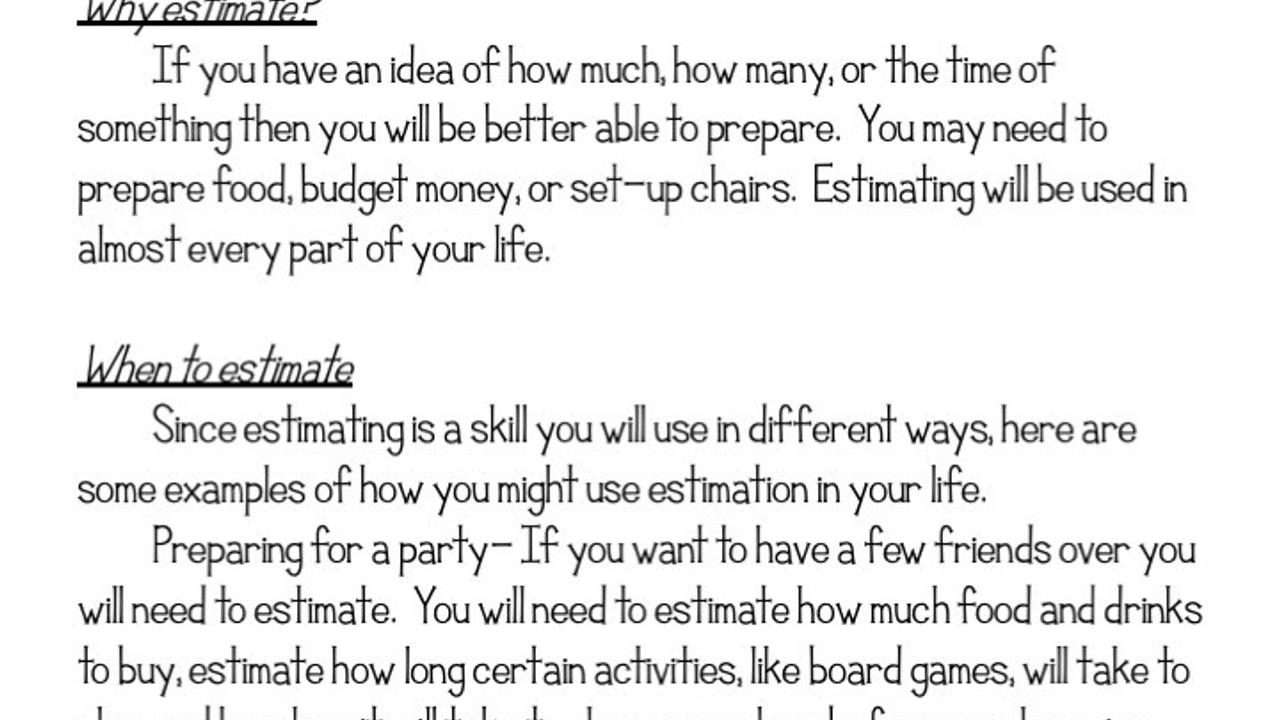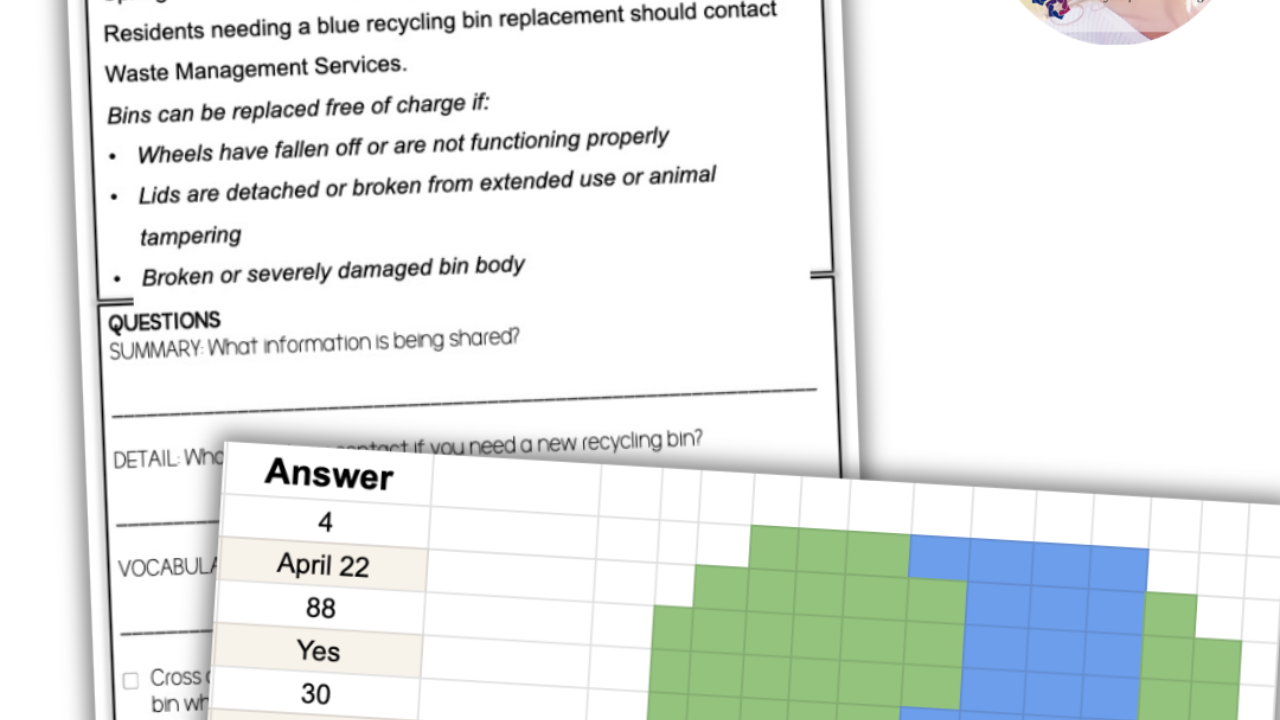How to Teaching Estimating Skills
Feb 27, 2021
Our next topic in the Consumer Math Blog Series is about how to teach Estimation. Read more about why and how you can teach Estimating using my Estimate Lesson Unit (click here to get your copy).
Purpose of Teaching Estimating
We as teachers are estimating constantly! We estimate nearly every part of our work day, so for us it seems rather natural to estimate other things. However, most of our students don’t estimate nearly as often as we do and may not know the benefits of estimating (which is why time management is a tricky skill for some). So, explicitly showing them what it means to estimate and how to estimate and WHEN to estimate may help them across so many environments.
Estimation Lesson Unit
Key-Must-Teach Concepts
Estimating is a skill that can be learned. Yes, you will get better at estimating the more experiences you have and the more you estimate, so there is value in doing it over and over and over again.
Incorrect estimating isn’t a bad thing (usually). If your students know that estimating is only a guess (albeit an educated guess), then they may be more willing TO guess. Throw out a number, see how close you are. The more you guess the more experience you are gaining and the more accurately you will guess next time.
Lesson Objective
Use estimation and compare to actual amounts to prepare/plan for a given scenario.
Lesson Unit Break Down
Day 1-Your students will have heard about estimating for many years and have probably engaged in different lessons throughout their time in school, but this will (hopefully) look a little different than the rest. Jump start the lesson with the brain teaser and how the estimating skill relates to other consumer math topics with the visual flow chart. Then, dive into the reading passage, see my Reading Passage Option below, and then check your student’s understanding with the T/F questions. End the class period with the writing prompts.
Day 2- You can start Notes during Day 1 or they could spill over into Day 2 and accompany your Parts worksheet, whatever works best for your class period schedule. Notes will help your students to see times when they can estimate within their school day and the Parts worksheet will help your students see bigger pictures estimates.
Day 3- Kick off the day with the Quick Question (or use it another day, it’s totally up to you). Then, divide into partners or small groups for the guided estimation practice. The practice has students plan a party for a group of 20 people. They will have to estimate one of three different scenarios. You can choose the scenario for them or let them choose, but a variety is nice. First, they will have to outline what they would need to estimate, give an estimate, and then research actual amounts.
Day 4- Today is for wrapping up the lesson unit. I suggest using the task cards as a review (see suggestion below) and then giving the assessment. As students finish up, give them the word search to help keep the room quiet. Once everyone is done, then do a whole class refresher on the functional math review. These skills can’t be practiced enough!
Estimation Lesson Unit
Reading Passage Option
If you want to really hone into any reading passage, ask students to pull out key sentences, phrases, or words. Ask them to ‘summarize’ the reading passage into three phrases (or sentences). This can be done individually, but is better at this point in the lesson to be done as a class. This activity will help you revisit and re-read the reading passage multiple times (always a good thing)!
Listen and Learn
A Listen & Learn is a short, 5 sentence PowerPoint/Google presentation that introduces the topic using visuals and audio. Ideal for non-readers! Read about what they are and how they might be right for your classroom here.
Estimation Lesson Unit
Task Card Idea
A fun way to review is to connect the task cards to a game- like Hangman (or Wheel of Fortune). I like to call it Spell it Out, it has a more positive connotation. Here is the gist: Divide the class into two large groups, ask the whole class the same question, if both large groups give the same right answer then the class gets to offer a letter towards the phrase. Continue this until all cards are gone through (feel free to repeat the ones the class missed). Come ready with more than 1 phrase.
Learn about your students Consumer Math habits with this FREE resource!
Further Practice Idea
Estimating is a great skill to practice in a grocery store, so if you can get out to one- then you could make a whole day of estimating! Here are the things you could estimate:
-
Travel time to the grocery store
-
Time to shop for the items on the shopping list
-
Time to get through the check out
-
The cost of the purchase
-
Weight of different fruits/vegetables
-
Cost of a deli meat purchase
-
Number of different kinds of fruits/vegetables/breads/etc that they sell
-
The temperature of the cooler or freezer department
-
How many aisles there are
-
The number of employees working while you are shopping
-
And so much more!
Ultimate Goal of the Lesson Unit
The goal of this lesson unit is to increase student’s ability to understand how to estimate so that they can estimate more accurately. While this doesn’t look like estimating accurately 100% of the time, it looks like estimating correctly the majority of the time. As we know, a lot of estimating skill comes with time and experience and that can’t be expected at the high school or transition level.
Estimation Lesson Unit
May I Also Suggest Teaching
Time Management, Trip Planning, and Budgeting ALL incorporate estimation skills and would be great additions to the estimation lesson. If I had to rank them in order of what you should follow-up the estimation lesson with, here is what I would suggest:
















